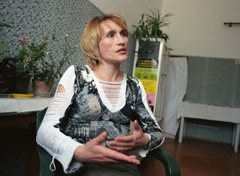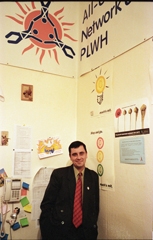Experience and evidence show that for an effective response to AIDS, it is essential to involve people living with HIV at all levels. Networks of people living with HIV are uniquely well qualified to help unify the response and maximize efforts to reach out to communities as well as influence national policy.

UNAIDS has produced a new report that describes
the background, structure and operation of the All-Ukrainian Network of People Living with HIV, as an example of best practice within the AIDS response.In order to promote and help replicate the work of associations of people living with HIV, UNAIDS has produced a new report that describes the background, structure and operation of the All-Ukrainian Network of People Living with HIV, as an example of best practice within the AIDS response.
“The All-Ukrainian Network of People Living with HIV has an innovative structure, has undertaken high profile successful advocacy campaigns at both national and local levels and has a strong track record of delivering an ever-expanding array of services to people living with HIV,” the report says. “From the outset, people living with HIV have been responsible for the Network’s very rapid growth and strategic importance in the country’s HIV response.
”Ukraine has the most severe HIV epidemic in Europe, with an estimated 377 600 people living with the virus at the end of 2005. The Network was formed in the late 1990s by people living with HIV alarmed by the rapidly growing HIV epidemic in the country and the lack of resources and support available to them and others living with the virus. Since then, the Network has grown rapidly and steadily from its registration in 2000 to its designation as a co-Principal Recipient of a Global Fund grant to distribute funds for treatment, care and support. In 2006, it provided services and support to more than 14000 people living with HIV.
 At the national level, the
At the national level, the
Network’s advocacy efforts have
resulted in a number of high
profile achievements in recent
years.The Network was established under four key strategy components: increasing access to non-medical care, treatment and support; lobbying and advocating to protect the rights of people living with HIV; increasing acceptance towards people living with HIV throughout society; and enhancing the organizational capacity of the Network.
Through its local branches and affiliated organizations, the Network provides services to thousands of people living with HIV across Ukraine. It also works with ‘indirect clients’, such as injecting drug users, health-care workers, journalists and law enforcement officials, as part of a broader effort to increase social tolerance, raise awareness about HIV transmission prevention and reduce stigma and discrimination.
More than 20 distinct types of services are offered around the country ranging from transportation and nutrition support to treatment literacy training and child-care facilities. Some local groups may even provide a teacher in instances when real or perceived discrimination keeps HIV-positive children out of public schools.
At the national level, the Network’s advocacy efforts have resulted in a number of high profile achievements in recent years, notably a series of meetings with the Ukrainian President in November 2005, where he committed to take personal control of the government’s response to the epidemic. Furthermore, recent advocacy and awareness-raising efforts at national level include continuing efforts to push the government to increase antiretroviral treatment and HIV testing availability through the public sector; working with the media to publicize issues such as poor service delivery; delays within the Ministry of Health; the high price of antiretroviral drugs; and corruption within the procurement and tendering processes.
 Local branches of the Network also initiate smaller-scale advocacy efforts that relate to their local needs.
Local branches of the Network also initiate smaller-scale advocacy efforts that relate to their local needs.Local branches of the Network also initiate smaller-scale advocacy efforts that relate to their local needs. For example, one group successfully filed and won a court case defending the rights of HIV-positive parents to maintain custody of their children. In August 2006, another group successfully advocated for the provision of antiretroviral treatment in local prisons. Within two months, five inmates were on treatment and two prisons now also have the capacity to provide CD4 testing.
The Network seeks to form partnerships with as many stakeholders as possible. It currently works with government agencies, international organizations, donor agencies and domestic NGOs. “Although often there are strategic and procedural differences with some of the partners, the Network has refused to break ties even as it lobbies, privately and publicly, for policy change,” the report states.
The Network’s collaboration with international organizations, bilateral donors and civil society groups has consisted of financial support, technical assistance, advocacy collaboration and policy development at local, national and international levels. Although initially the Network was mainly the recipient of the assistance, as it has developed, it has played a growing role in identifying ways to share its expertise and experience.
Underlining the Network’s importance as an example of best practice, UNAIDS Partnerships Advisor Kate Thomson said: “This is a role model for positive networks the world over and provides us with a truly inspiring example of positive people coming together to make a difference in the AIDS response.”
Links:
Download the Best Practice - A Nongovernmental Organization’s National Response to HIV: the Work of the All-Ukrainian Network of People Living with HIV
Read more on Ukraine
Other UNAIDS Best Practice reviews:
Learning from experience
A faith-based response to HIV in Southern Africa
Traditional healers join the AIDS response
Focused AIDS programmes in Asia and the Pacific
Injecting drug use: focused HIV prevention works





